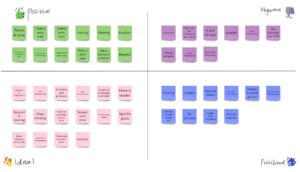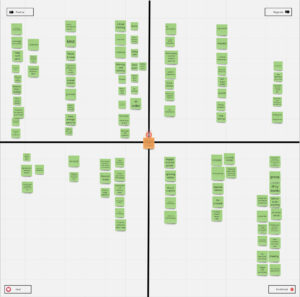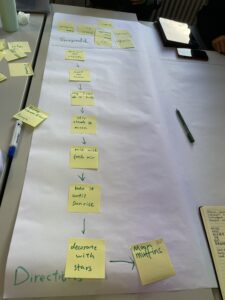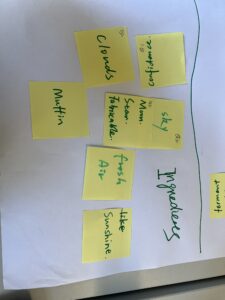For suggestions on ways to work in teams with peers, I have thought about the following four main points about how to create a positive collaborative environment.
The first is to be included in the team and to see yourself as a collaborator with the team. I believe that a team is not simply about bringing the group together, but about each person fitting in and the group thinking and working together in the same way. This requires each of us to think of ourselves as collaborators in the team, actively offering our opinions and views, following the progress of tasks and pushing for solutions, rather than standing by and shirking our responsibilities. We can even take on more responsibility for the betterment of the project.
The second point I think is very important is to get to understand the people and to appoint them well. Because everyone has areas where they are good and areas where they are not, and everyone’s abilities are reflected in different areas. If tasks are not assigned according to the working ability of the group members, it will lead to the efficiency and quality of work being affected. If everyone takes responsibility for their own tasks in terms of their actual abilities and ensures that they function in the part they are responsible for, which in turn drives the progress of the whole task, then not only will work efficiency be greatly improved, but teamwork will also create higher value.
Then it’s all about learning to communicate and actively supporting the work of others. When it comes to cooperation, there will inevitably be all kinds of friction and misunderstandings caused by communication. The way and the attitude in which these issues are handled is very important and well worth learning from each and every one of us. Personally, I think the most effective way is to learn to think differently, to put yourself in the other person’s situation and think about the reasons for the problems and solutions. Don’t be stingy with support and encouragement if others need help, and try to seek help from others even if it is impossible to solve the problem yourself.
Last but not least, I think it is also important to focus on the general overall situation and continuous self-improvement. If you only focus on your own functional modules, then your vision will remain limited to one part of the task and your perception of the whole project will become one-sided. Therefore, it is important to look at your part of the project from a holistic perspective so that you can not only understand the task better, but also have a better grasp of the whole task. Also, when faced with questions from the audience, each member of the team is able to talk about the whole project in a calm manner, instead of just talking about their own part. At the same time, it is best to keep improving one’s own abilities, to grow in the team and then drive the growth of others, which is not only the team’s luck but also one’s own.
In conclusion, these are my thoughts on the Sprint’s problem scenario.






s2185092
23rd October 2022 — 4:15 pm
I very much agree with the empathy proposed by the author. If everyone can think about problems from the perspective of others, it is very conducive to cooperative learning between groups. Growing up on a team is definitely a win-win option.
s2440254
23rd October 2022 — 7:42 pm
In your blog, you mentioned an important key word in teamwork: “empathy and reasonable allocation of resources”. The main purpose of learning or working in groups is to bring out the greater value of each person.
s2430290
23rd October 2022 — 9:45 pm
The view from Borui related to basho meeting is informative.
wjake
24th October 2022 — 1:26 pm
Borui Zhang, this was a comprehensively considered first post that demonstrates the depth with which you have contemplated this week’s activity. You did well to order your thoughts and communicate them clearly across four connected but distinct points.
To further enhance the clarity of your argument, try to ensure you reference academic material and examples from the course. This will help provide rigor that will aid the persuasiveness of the points you are making.
Again, well done this is a great start to blogging on the course!